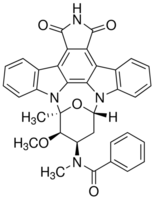All AbMole products are for research use only, cannot be used for human consumption.

Stauprimide is an enhancer stem cell differentiation into endoderm. In vitro differentiation of embryonic stem cells is of great interest to regenerative medicine, and current protocols are labor-intensive and expensive. Small molecules that induce or enhance differentiation are highly desired. High-content screening identified compounds that enhance endodermal differentiation in the presence of low levels of Activin A. Stauprimide increased definitive endodermal markers but not markers for visceral/parietal endoderm or mesoderm. Stauprimide-differentiated cells could be further differentiated into hepatocytes. Stauprimide treatment during differentiation decreased the concentration of Activin A required for definitive endoderm formation, and it eliminated the need for serum. The mechanism of action of stauprimide is to sensitize cells for differentiation. Stauprimide enabled differentiation into other cell lineages under varying differentiation conditions, including neurons, hematopoietic mesoderm, beating cardiac myocytes, and skeletal muscle. The cellular target of stauprimide was determined to be inhibition of NME2 transcription factor translocation to the nucleus, leading to down-regulation of c-Myc expression.
| Molecular Weight | 584.62 |
| Formula | C35H28N4O5 |
| CAS Number | 154589-96-5 |
| Solubility (25°C) | DMSO: ≥20 mg/mL |
| Storage |
Powder -20°C 3 years ; 4°C 2 years In solvent -80°C 6 months ; -20°C 1 month |
[1] Claire Bouvard, et al. Small molecule selectively suppresses MYC transcription in cancer cells
[5] Shoutian Zhu, et al. A small molecule primes embryonic stem cells for differentiation
| Related Products |
|---|
| DSPE-PEG-FA
DSPE-PEG2K-FA is a PEG derivative containing folic acid. DSPE-PEG2K-FA has a targeting effect and can bind to folic acid receptors in cancer cells. DSPE-PEG2K-FA forms micelles/lipid bilayers and can be used in research on targeted drug delivery systems. |
| Lifastuzumab
Lifastuzumab is a humanized anti-NaPi2b IgG1 monoclonal antibody. |
| GPVI antagonist 1
GPVI antagonist 1 is a glycoprotein VI (GPVI) platelet receptor antagonist. GPVI antagonist 1 inhibits collagen-induced platelet aggregation with an IC50 of 25.3 μM. |
| MPSD TFA
MPSD TFA (MARCKS-ED TFA) is a 25-amino acid peptide based on the effector domain sequence of the intracellular membrane protein myristoylated alanine-rich C-kinase substrate (MARCKS). MPSD TFA can sense membrane curvature and recognize phosphatidylserine. MPSD TFA can be utilized as biological probe to study membrane shape and lipid composition. |
| 4-Nitro-2,1,3-benzoselenadiazole
4-Nitro-2,1,3-benzoselenadiazole is a biochemical material that can be used in scientific research. |
All AbMole products are for research use only, cannot be used for human consumption or veterinary use. We do not provide products or services to individuals. Please comply with the intended use and do not use AbMole products for any other purpose.


Products are for research use only. Not for human use. We do not sell to patients.
© Copyright 2010-2024 AbMole BioScience. All Rights Reserved.
